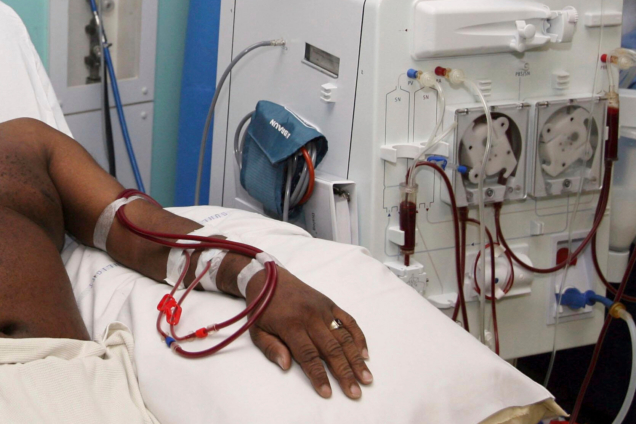
Audio By Carbonatix
Over 90% of Ghanaian kidney failure patients who desperately need dialysis are being denied access to this life-saving treatment. This is according to a yet-to-be-published study titled "50 years of hemodialysis in Ghana - current status, utilisation, and cost of dialysis services."
This study authored by Elliot Koranteng Tannor and his dedicated team, has unveiled statistics that expose the harsh reality of the situation.
The report reveals alarming figures. In Ghana, the overall dialysis prevalence is just 38.8 patients per million population. To put it simply, only 38.8 out of every one million Ghanaians are receiving dialysis treatment. This prevalence rate falls far below not just the African average (79 per million) but also the global average (296 per million).
In fact, Ghana's rate is even lower than the average for other low and middle-income countries, standing at just 68 per million. These numbers paint a bleak picture, indicating that many Ghanaian patients in dire need of dialysis are unable to access this critical treatment.
Global estimates suggest that Ghana should have around 15,400 patients requiring dialysis. However, the current number of patients receiving dialysis is a mere 1195. This represents a mere 7.8% of the estimated demand for this life-saving treatment. The rest, a staggering over 90%, are left grappling with a lack of access to the care they need to survive.
Dialysis centres, though desperately needed, are grappling with limited capacity. The median number of patients per centre is just 20. However, despite these constraints, most centres are operating at or even over maximum capacity to meet the overwhelming demand.
The quality of dialysis care in Ghana is also under threat. A significant factor affecting quality is the limited nephrology workforce. Ghana has only 0.44 nephrologists per million population, well below the global average for low and middle-income countries (1.6 per million).
The shortage of nephrologists directly impacts the quality of care, with 57.5% of dialysis centres in Ghana lacking a resident or visiting nephrologist. Without specialised kidney care doctors, it is challenging to adequately monitor patients and provide appropriate treatment.
Adding to the crisis is the exorbitant cost of dialysis treatment in Ghana. The mean cost per dialysis session is a daunting $53.9. While public centres offer a glimmer of hope with a lower cost of $48.2 per session, private facilities charge $56.7 on average, approximately 18% more.
For the average Ghanaian, where the monthly minimum wage hovers around a meagre $55.70, these costs represent a staggering financial burden. The National Health Insurance Scheme, designed to provide a safety net, does not cover dialysis costs, leaving most patients to pay fully out-of-pocket.
Latest Stories
-
Ablakwa secures rare access to Ghana’s 2 prisoners of war in Ukraine, pushes for their release
23 minutes -
Today’s Front pages: Friday, February 27, 2026
35 minutes -
Premier League: Arsenal v Chelsea preview
44 minutes -
Ghana loses over GHS 6.2bn annually to poor sanitation – ISSER study warns
1 hour -
Prudential Bank marks February with distribution of Ghanaian chocolate to customers
2 hours -
KMA finally elects Presiding Member after stalemate
3 hours -
Nana B rallies Ayawaso East voters to back NPP’s Baba Ali in March 3 by-election
3 hours -
Be honest with Ghanaians on gold policy – Oppong Nkrumah to gov’t
3 hours -
Lands Minister refutes claims of missing seized excavators, unveils tracking system
3 hours -
Ghana set to launch National AI Strategy to boost local innovation – Sam George
3 hours -
PURC gives ECG 48 hours to fix prepaid metering concerns
3 hours -
Makola No. 2 Market managers justify rent increase amid traders’ protests
3 hours -
Mahama to deliver 2026 State of the Nation Address today
3 hours -
Rapid prepaid electricity depletion not caused by smart meters – Adomako-Mensah rejects ECG’s assertion
3 hours -
GoldBod warns licence holders over failure to file monthly gold transaction reports
3 hours

